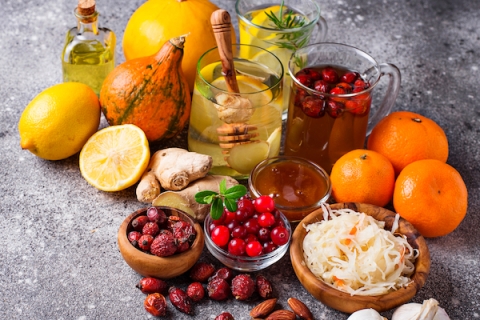

Check out the list of foods you should add to your shopping list.
The benefits of a strong immune system
The benefits of a strong immune system have been widely discussed in recent times with many health officials encouraging those in England to ensure we're as healthy as possible. Obesity has been identified as a risk factor in relation to the COVID-19 pandemic and whether this relates to you or not we can all agree the healthier we are the better we feel.
Nutrition can play a large part in us achieving our exercise and fitness goals with us talking at lengths about various nutrition-based articles that can be found on our blog. We talked about calculating calorie intake and maintaining energy balance, providing a range of recipes, discussing macronutrients and how nutrition can help our wellbeing.
Certain foods in your diet may help to keep your immune system strong. Planning meals with any of these 15 foods can give your immune system a boost and make us feel better. Whenever you are looking for ways to prevent colds, flu or infections, your local food shop should be your first stop, think high-levels of vitamin C and healthy nutritious food. The closer our nutrition is to nature the better, fresh fruits and vegetables, grains, meats and fish without too much processing is a sure-fire way to eat healthily.
Remember variety is key to proper nutrition. Pay attention to serving size and recommended daily intake so you are not getting too much of a single vitamin or too little of another, an app like MyFitnessPal can help you keep track of these.
Check out the list of foods which can give your immune system a fighting chance
Ginger
Is one of those foods many turn to when sick. Ginger may help reduce inflammation which is why it is commonly used for a sore throat or other inflammation-related illnesses. Ginger may also help with nausea. Many will commonly know ginger to be used in sweet desserts, but root ginger can be used in curries and many fish dishes.
Spinach
Spinach is not only packed with vitamin C but is also full of numerous antioxidants and beta carotene, which may increase the infection-fighting ability of our immune system. Spinach is best when cooked as little as possible, so it can retain its nutrients. Try adding to omelettes.
Yoghurt
When looking at yoghurts, look for ‘live and active cultures’ when reading the label. As these cultures may help stimulate the immune system to fight disease. Try plain yoghurts over those with added flavours and sugars. As you can always add natural sweeteners, like fruit and honey. Yoghurts can be a great source of vitamin D and this vitamin helps regulate the immune system as well as being able to boost the body's natural ability to defend itself against disease. There are even clinical trials taking place to see the effect vitamin D has on COVID- 19 (1).
Red peppers
Did you know that ounce for ounce a red pepper contains 3 times as much vitamin C as an orange? Red peppers are also rich in beta carotene. On top of boosting the immune system, vitamin C is also important for maintaining skin health. Beta Carotene is converted into vitamin A by the body which helps keep eyes and skin healthy.
Sunflower seeds
Vitamins B-6, vitamin E, magnesium and phosphorus as well as other nutrients can be found in sunflower seeds. Vitamin E is important for maintaining and regulating a healthy immune system. Avocados and dark leafy greens are also high in vitamin E. Try adding to cous-cous, quinoa, porridge or even eat a handful for a snack.
Turmeric
Many will know this one as a key ingredient for curries. However, it has also been used for many years as an anti-inflammatory. The high concentration of curcumin (which is what makes turmeric bright yellow), has been found to reduce the onset of muscle soreness (2). This spice is also showing promising results regarding its ability to boost the immune system, however, more research is needed. Try adding a small amount of turmeric to scrambled eggs to get some more in your diet.
Citrus fruit
After catching a cold most people turn to vitamin C, which makes sense as it helps build your immune system. Vitamin C is thought to increase the production of white blood cells which are key to fighting infections. With almost all citrus fruits being high in vitamin C you have a variety to choose from: grapefruit, oranges, lemons, limes, tangerines, clementines are a few examples. Remember your body doesn't store vitamin C so it needs it daily for continued health.
Garlic
This food adds a little zing to your meals and is a must-have for your health. The immune-boosting properties of garlic appear to come from its sulfur-containing compounds such as allicin.
Green tea
Flavonoids (a type of antioxidant) are found in abundance in green and black teas. Green tea is full of epigallocatechin (EGCG). Studies have found EGCG can enhance immune function (3). Black tea goes through a fermentation process resulting in most of the EGCG being lost, while green tea is steamed, preserving the EGCG.
Kiwi
An underrated fruit, these are another fruit full of essential nutrients including vitamin C, vitamin K, folate and potassium. Vitamin C to help boost the body's white blood cells to fight infection and the other nutrients help to keep the body functioning properly.
Poultry
Chicken soup or even a homemade chicken stock is something that is often suggested when sick and it may help to lower inflammation, which improves the symptoms of a cold. Chicken and turkey are high in vitamin B-6, which plays an important role in chemical reactions in the body. It is also key to the formation of new and healthy red blood cells. Try to have a chicken soup without too much cream added.
Shellfish
This one might never have crossed your mind to help with a healthy immune system but shellfish is packed with Zinc, and it is important so our immune cells can function correctly. Types of shellfish which are high in zinc are lobster, crab, mussels, oysters. Get yourself down to Viviers for the freshest fish in Portsmouth.
Papaya
Did you know you can find double the amount of the daily recommended intake of vitamin C in a single medium-sized Papaya? Papayas also have a digestive enzyme called papain that has anti-inflammatory effects. You will also find magnesium, folate and potassium in Papayas, which is beneficial to your overall health. Plus it’s a fun word to say.
Broccoli
This vegetable is packed with vitamins A, C and E, as well as fibre and many other antioxidants. Did you know the key to keeping its benefits intact is with minimal cooking or no cooking at all? Steaming is the best way to keep nutrients in your food. The stalk also contains a lot of nutrients, finely chop and cook with the florets to reap the benefits without risking undercooking the stalk.
Almonds
Vitamin E tends to be overlooked for vitamin C when thinking of preventing or fighting off colds. Vitamin E, however, is key to a healthy immune system. Being a fat-soluble vitamin it requires fat to be absorbed. Nuts such as almonds are packed with vitamin E as well as having healthy fats. Be careful not to go crazy though, think a handful rather than a packet.

